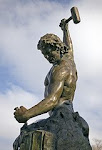Thank you for The Killing of History, an intellectual, historical, and literary treat. I am giving copies for Xmas, both for their enjoyment and hoping they will help parents and kids counter some of the nonsense students are exposed to. Your examples of fraudulent, incompetent history accepted at universities in the name of political correctness and diversity demonstrate the undermining of true education.
You mention Foucault's neglect of crediting sources he likely drew upon and you discuss his argument that the medical model applied to psychology has been used to repress unconventional attitudes and lifestyles. Dr. Thomas Szasz argued against the misuses of the medical model much more cogently and accurately in his The Myth of Mental Illness, published in 1961, two years before the Foucault work you cited. Moreover, Szasz was not trying to argue that minds are incompetent tools.
I appreciate the discussion of the issue of theory coloring observations, and in particular history. It occurs to me that those who maintain that theory is controlling in every observation, must also maintain that, since dogs observe, dogs must have theories? Else, they are maintaining that only beings with theories (conceptual thought) are unable to accurately observe reality? Whereas, beings with only perceptual thought can do quite well? I suppose they want to say that anyone who puts an observation into language necessarily uses theory and cannot distinguish perception from conception? The implication is that reason is not a means of knowledge, subject to error and error correction, but is necessarily a distortion of reality. This in essence seems the view of Kant and all of his various followers, who, while usually touted as supporters of reason, are actually anti-reason -- reversing cause and effect, and encouraging a reliance on emotions as knowledge.
An issue you did not address is what makes these intellectually dishonest fools influential in our culture? Thinkers like yourself are self-made, through years of effort in building a hierarchy of objective values, in refining methodologies, and in identifying and resolving confusions. How is it that a seemingly increasing percentage of people in universities fail to develop these virtues and values?
Obviously, their failure is not an act of effort, but of lack of effort. What these people have is a default, non-intellectual morality of tribal collectivism and altruism. This cannot be defended rationally; so, only irrationality will do for them. Their emotions tell them so. To paraphrase Ayn Rand: They cannot build, but they must act; so, they only destroy.
I suggest that the central influence in the last hundred years in intellectually and morally crippling students is the increasing government support for schools and universities. With financial support comes political influence on textbooks, teacher qualifications, teacher unionization, and forced attendance in approved institutions.
It is government influence that creates the jobs and pulpits for fools and intellectual failures, whether in the arts, science, or education. In a degenerative cycle, with progressive generations the citizens, the government, and the schools get worse. The resulting culture is one which has degenerated into fostering postmodernism philosophy. Would any of the promoters of such nonsense find jobs and pulpits if they had to rely on support from private citizens?
In the Europe of past centuries, government money and influences supported religions and schools that promoted religious teachings, else these teachings would not have been so influential. Today, governments are promoting the religions of environmentalism, multiculturalism, relativism, collectivism, etc.

